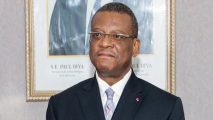Categories
Recent Posts
- Football: Panthère du Ndé Wins Cameroon Cup 2025
- Fifa brings in new £45 ticket for 2026 World Cup
- President Sisiku Ayuk Tabe, top aides to appear before the Supreme Court
- Pressure mounts on Biya as speculation grows over possible replacement of Ngute
- 2025 is the year when Biya’s long rule finally lost its last convincing justification
Archives
- December 2025
- November 2025
- October 2025
- September 2025
- August 2025
- July 2025
- June 2025
- May 2025
- April 2025
- March 2025
- February 2025
- January 2025
- December 2024
- November 2024
- October 2024
- September 2024
- August 2024
- July 2024
- June 2024
- May 2024
- April 2024
- March 2024
- February 2024
- January 2024
- December 2023
- November 2023
- October 2023
- September 2023
- August 2023
- July 2023
- June 2023
- May 2023
- April 2023
- March 2023
- February 2023
- January 2023
- December 2022
- November 2022
- October 2022
- September 2022
- August 2022
- July 2022
- June 2022
- May 2022
- April 2022
- March 2022
- February 2022
- January 2022
- December 2021
- November 2021
- October 2021
- September 2021
- August 2021
- July 2021
- June 2021
- May 2021
- April 2021
- March 2021
- February 2021
- January 2021
- December 2020
- November 2020
- October 2020
- September 2020
- August 2020
- July 2020
- June 2020
- May 2020
- April 2020
- March 2020
- February 2020
- January 2020
- December 2019
- November 2019
- October 2019
- September 2019
- August 2019
- July 2019
- June 2019
- May 2019
- April 2019
- March 2019
- February 2019
- January 2019
- December 2018
- November 2018
- October 2018
- September 2018
- August 2018
- July 2018
- June 2018
- May 2018
- April 2018
- March 2018
- February 2018
- January 2018
- December 2017
- November 2017
- October 2017
- September 2017
- August 2017
- July 2017
- June 2017
- May 2017
- April 2017
- March 2017
- February 2017
- January 2017
- December 2016
- November 2016
- October 2016
- September 2016
- August 2016
- July 2016
- June 2016
Featured
 2025 is the year when Biya’s long rule finally lost its last convincing justification
2025 is the year when Biya’s long rule finally lost its last convincing justification  Young Cameroonians: Build social capital to succeed
Young Cameroonians: Build social capital to succeed  Eulogy for HRH Nfor Professor Teddy Ako of Ossing
Eulogy for HRH Nfor Professor Teddy Ako of Ossing  Will Fr. Paul Verdzekov recognize the refurbished and rededicated Cathedral in Bamenda were he to return today?
Will Fr. Paul Verdzekov recognize the refurbished and rededicated Cathedral in Bamenda were he to return today?  Cameroon apparently under a de facto federalism
Cameroon apparently under a de facto federalism
Most Commented Posts
 4 Anglophone detainees killed in Yaounde
4 Anglophone detainees killed in Yaounde
18 comments Chantal Biya says she will return to Cameroon if General Ivo Yenwo, Martin Belinga Eboutou and Ferdinand Ngoh Ngoh are sacked
Chantal Biya says she will return to Cameroon if General Ivo Yenwo, Martin Belinga Eboutou and Ferdinand Ngoh Ngoh are sacked
13 comments The Anglophone Problem – When Facts don’t Lie
The Anglophone Problem – When Facts don’t Lie
12 comments Anglophone Nationalism: Barrister Eyambe says “hidden plans are at work”
Anglophone Nationalism: Barrister Eyambe says “hidden plans are at work”
12 comments Largest wave of arrest by BIR in Bamenda
Largest wave of arrest by BIR in Bamenda
10 comments
Latest Tweets
Featured
-

Football: Panthère du Ndé Wins Cameroon Cup 2025
-

Fifa brings in new £45 ticket for 2026 World Cup
-

President Sisiku Ayuk Tabe, top aides to appear before the Supreme Court
-

Pressure mounts on Biya as speculation grows over possible replacement of Ngute
-

2025 is the year when Biya’s long rule finally lost its last convincing justification
-

Armed Mbororo tribesmen killed 8 in Southern Cameroons’ new war
-

Southern Cameroons Crisis: Atanga Nji Boys abduct 8 people en route to Kumbo
© Cameroon Concord News 2025
30, January 2018
Southern Cameroons Crisis: Rising internet shutdowns aimed at ‘silencing dissent’ 0
Governments around the world are increasingly shutting down internet access in an apparent attempt to silence discontent and dissent, activists say. In 2017, internet access was cut off more than 80 times around the world, up from 56 times the year before, drawing concerns from digital rights activists.
“We do see this as evidence for a global trend in the wrong direction,” Peter Micek of Access Now told Al Jazeera. One of the countries that have seen several shutdowns in the past year is Cameroon. People in the Anglophone region of the West African nation erupted in protests against the imposition of the French language, which is spoken by the majority of the population.
For four months now, access to social media websites such as Facebook and Twitter and messaging services like WhatsApp has been blocked in the English-speaking parts of the country. The blockage, implemented in early October after protests against the Cameroonian government, was the second shutdown in Anglophone regions in 2017. From January to April, all internet access was cut.
The United Nations, human rights organisations, and even the pope condemned the first shutdown. “Rather than dialogue, the government embarked on a crackdown and shutting down the internet was a way of stopping the world from seeing or hearing about the atrocities being committed and stopping information flow between groups planning peaceful demonstrations and civil disobedience,” Cameroonian human rights activist Judith Nwana told Al Jazeera.
For Nwana, the issue goes further than her home country. According to her, governments that feel threatened can use the internet as another repressive tool, with no consequences. “Every time I hear of an episode of internet shutdown I feel very frustrated. They are becoming more frequent, which reflects the fact that governments know they can get away with it with no repercussions,” she said.
Nwana’s claim that shutdowns are happening more often is backed up by research from the Brookings Institute and Access Now. For people in Iran, the power authorities have over the internet became apparent again in December when protesters took to the streets. Social media and messaging apps were blocked by the government to prevent demonstrators from organising.
Micek from Access Now said internet shutdowns to suppress peaceful demonstrations are a slippery slope. “Edward Snowden sent out a tweet last year which stated that once shutdowns become the norm in places like Cameroon and nobody says anything about it, this type of behaviour tends to spread to other places,” Micek said.
And when a country orders a shutdown of the internet, there is not much that can be done by its citizens, private companies, or the international community.
What can the UN do if your country cuts the internet?
“There should be a way of pressuring or sanctioning the perpetrators so shutdowns can be lifted as soon as possible. Failing that, it should be a case of putting that government to shame and under pressure through media coverage, advocacy and diplomacy,” Nwana said.
Micek said he thinks the only option to get the internet switched back on is to hit blocking countries where it hurts, namely their wallets.
“The International Monetary Fund (IMF) issued a loan of hundreds of millions of dollars to Cameroon, which came shortly after the first shutdown in January 2017. What message does this send when an international finance institution throws treasure at governments that clearly disrespect the rights of its citizens?” Micek said.
“Many institutions just need to quietly express their frustration and put down some real consequences, make the governments feel the pain that the citizens are put through.”
But Cameroonians are not willing to wait for others to intervene, so they have recently taken authorities to the Cameroonian Constitutional and High courts with the help of Access Now and Internet Sans Frontieres.
The lawsuit says Anglophones are being discriminated against since the shutdowns are only happening in English-speaking areas. It also states the ban is in violation of several international human rights charters signed by Cameroon.
“Depriving people of the internet interferes with a range of fundamental human rights,” the lawsuit states, citing the United Nations and the European Court of Human Rights. The case comes several months before the October elections, which may be heavily affected by the closures, according to Nwana.
She is not sure if elections should even take place at all given the current state of the country, she said.
“For successful elections anytime this year in Cameroon, registration, campaigning and dissemination of information should be going on right now. Most people, especially the young who form the larger proportion of the population, get their information via social media,” Nwana said.
“How are elections going to be planned or made possible in those regions with internet restrictions right now?”
Micek agreed that having elections under the current circumstances might not be a good idea, not just for Cameroon, but for any country that shuts down the internet. “When you have an entire population that’s silenced and shut out of political discourse, that’s not a recipe for a healthy and stable democracy.”
Source: Aljazeera